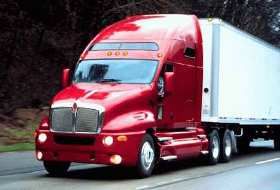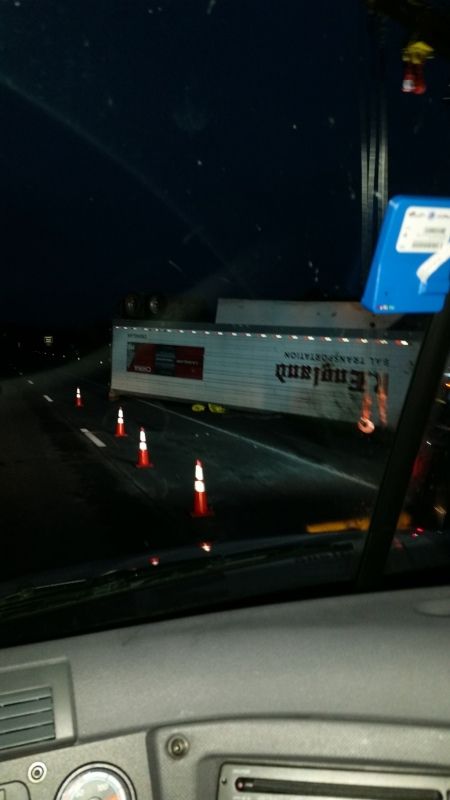One Fine Morning On I-55 In Missouri
Topic 9613 | Page 1

There was probably a guy sleeping in that bunk, and that's why I don't train TNTs.
TNT:
Trainer-N-Trainee
Prime Inc has their own CDL training program and it's divided into two phases - PSD and TNT.
The PSD (Prime Student Driver) phase is where you'll get your permit and then go on the road for 10,000 miles with a trainer. When you come back you'll get your CDL license and enter the TNT phase.
The TNT phase is the second phase of training where you'll go on the road with an experienced driver for 30,000 miles of team driving. You'll receive 14¢ per mile ($700 per week guaranteed) during this phase. Once you're finished with TNT training you will be assigned a truck to run solo.
Whoa! 

Just curious (i'm not a driver yet), would this be the end of someone's career in trucking?
Just curious (i'm not a driver yet), would this be the end of someone's career in trucking?
No it wouldn't. There probably wouldn't be any major companies or highly reputable companies that would hire you but there would be a ton of smaller, more "outlaw" type companies that would. There are a lot of small companies around the country that still do things the old school way. They'll hand you paper logbooks, tell you to stay out of trouble, and load you up with all the miles any human can handle.
Once you got a few years of safe driving behind you again you'd be able to work your way back into the companies with high hiring standards. Then again, once you did some old school driving you might not want to go back.
It won't be long before everyone is required to run electronic logs though. The outlaw ways are slowly disappearing.
Logbook:
A written or electronic record of a driver's duty status which must be maintained at all times. The driver records the amount of time spent driving, on-duty not driving, in the sleeper berth, or off duty. The enforcement of the Hours Of Service Rules (HOS) are based upon the entries put in a driver's logbook.
Electronic Logs:
Electronic Onboard Recorder
Electronic Logbook
A device which records the amount of time a vehicle has been driven. If the vehicle is not being driven, the operator will manually input whether or not he/she is on duty or not.
SAP:
Substance Abuse Professional
The Substance Abuse Professional (SAP) is a person who evaluates employees who have violated a DOT drug and alcohol program regulation and makes recommendations concerning education, treatment, follow-up testing, and aftercare.
EPU:
Electric Auxiliary Power Units
Electric APUs have started gaining acceptance. These electric APUs use battery packs instead of the diesel engine on traditional APUs as a source of power. The APU's battery pack is charged when the truck is in motion. When the truck is idle, the stored energy in the battery pack is then used to power an air conditioner, heater, and other devices
This accident happened around 3:30 am. Moderate traffic for that time. (I'm driving a shuttle lane right now, so I'm there every morning.) My guess is the southbound driver nodded off, cruised into the middle divider and then crossing the NB side, got a nice roll-over from the ditch/hillside on the NB shoulder.
The ambulance went in lights-and-siren, but left code 2 ("regular"), with lights on in the back. I suppose the driver was injured. (Old School saw more of this accident after daylight - see his Ride Along With Old School page 5.)
There was probably a guy sleeping in that bunk, and that's why I don't train TNTs.
I was on the backing range at Celadon one day. They brought a completely decimated Kenworth T680 (that's what our teams run) in. Cab was totally ripped from the frame, which was bent at an angle. Made my mind up right then I was going solo. I don't knew if they were ok, but I know they both graduated together.
TNT:
Trainer-N-Trainee
Prime Inc has their own CDL training program and it's divided into two phases - PSD and TNT.
The PSD (Prime Student Driver) phase is where you'll get your permit and then go on the road for 10,000 miles with a trainer. When you come back you'll get your CDL license and enter the TNT phase.
The TNT phase is the second phase of training where you'll go on the road with an experienced driver for 30,000 miles of team driving. You'll receive 14¢ per mile ($700 per week guaranteed) during this phase. Once you're finished with TNT training you will be assigned a truck to run solo.

This roll-over stopped traffic for 1 1/2 hours before one lane could be opened. It looks like the truck/trailer may have come across the divider (the trailer is pointing the "wrong" way, besides being upside down.) Occurred about 3:30am NB, about 90 miles south of St. Louis. You can just see the highlights of the trailer tandem wheels on top of the trailer. The tractor was in the same predicament.
Man. And I thought I had a bad day yesterday
Tandem:
Tandem Axles
A set of axles spaced close together, legally defined as more than 40 and less than 96 inches apart by the USDOT. Drivers tend to refer to the tandem axles on their trailer as just "tandems". You might hear a driver say, "I'm 400 pounds overweight on my tandems", referring to his trailer tandems, not his tractor tandems. Tractor tandems are generally just referred to as "drives" which is short for "drive axles".

Just curious (i'm not a driver yet), would this be the end of someone's career in trucking?
No it wouldn't. There probably wouldn't be any major companies or highly reputable companies that would hire you but there would be a ton of smaller, more "outlaw" type companies that would. There are a lot of small companies around the country that still do things the old school way. They'll hand you paper logbooks, tell you to stay out of trouble, and load you up with all the miles any human can handle.
Once you got a few years of safe driving behind you again you'd be able to work your way back into the companies with high hiring standards. Then again, once you did some old school driving you might not want to go back.
It won't be long before everyone is required to run electronic logs though. The outlaw ways are slowly disappearing.
What do you mean by old school driving? I understand that drivers must log their hours and progression, but I don't see how that would change the industry drastically "per se".
Logbook:
A written or electronic record of a driver's duty status which must be maintained at all times. The driver records the amount of time spent driving, on-duty not driving, in the sleeper berth, or off duty. The enforcement of the Hours Of Service Rules (HOS) are based upon the entries put in a driver's logbook.
Electronic Logs:
Electronic Onboard Recorder
Electronic Logbook
A device which records the amount of time a vehicle has been driven. If the vehicle is not being driven, the operator will manually input whether or not he/she is on duty or not.
SAP:
Substance Abuse Professional
The Substance Abuse Professional (SAP) is a person who evaluates employees who have violated a DOT drug and alcohol program regulation and makes recommendations concerning education, treatment, follow-up testing, and aftercare.
EPU:
Electric Auxiliary Power Units
Electric APUs have started gaining acceptance. These electric APUs use battery packs instead of the diesel engine on traditional APUs as a source of power. The APU's battery pack is charged when the truck is in motion. When the truck is idle, the stored energy in the battery pack is then used to power an air conditioner, heater, and other devices

Just curious (i'm not a driver yet), would this be the end of someone's career in trucking?
No it wouldn't. There probably wouldn't be any major companies or highly reputable companies that would hire you but there would be a ton of smaller, more "outlaw" type companies that would. There are a lot of small companies around the country that still do things the old school way. They'll hand you paper logbooks, tell you to stay out of trouble, and load you up with all the miles any human can handle.
Once you got a few years of safe driving behind you again you'd be able to work your way back into the companies with high hiring standards. Then again, once you did some old school driving you might not want to go back.
It won't be long before everyone is required to run electronic logs though. The outlaw ways are slowly disappearing.
What do you mean by old school driving? I understand that drivers must log their hours and progression, but I don't see how that would change the industry drastically "per se".
I think he's talking about paper vs electronic logs. Paper is the old school way nowadays, and it's much easier to run longer and harder in a more " outlaw-ish" way than if you're on e-logs.
But since we'll all soon be forced to be on e-logs anyway, the proverbial wild west of trucking is going the way of the dodo. The frontier is disappearing. Sad.
Logbook:
A written or electronic record of a driver's duty status which must be maintained at all times. The driver records the amount of time spent driving, on-duty not driving, in the sleeper berth, or off duty. The enforcement of the Hours Of Service Rules (HOS) are based upon the entries put in a driver's logbook.
Electronic Logs:
Electronic Onboard Recorder
Electronic Logbook
A device which records the amount of time a vehicle has been driven. If the vehicle is not being driven, the operator will manually input whether or not he/she is on duty or not.
SAP:
Substance Abuse Professional
The Substance Abuse Professional (SAP) is a person who evaluates employees who have violated a DOT drug and alcohol program regulation and makes recommendations concerning education, treatment, follow-up testing, and aftercare.
EPU:
Electric Auxiliary Power Units
Electric APUs have started gaining acceptance. These electric APUs use battery packs instead of the diesel engine on traditional APUs as a source of power. The APU's battery pack is charged when the truck is in motion. When the truck is idle, the stored energy in the battery pack is then used to power an air conditioner, heater, and other devices
New Reply:
New! Check out our help videos for a better understanding of our forum features

















Preview:









 TT On Facebook
TT On Facebook
This roll-over stopped traffic for 1 1/2 hours before one lane could be opened. It looks like the truck/trailer may have come across the divider (the trailer is pointing the "wrong" way, besides being upside down.) Occurred about 3:30am NB, about 90 miles south of St. Louis. You can just see the highlights of the trailer tandem wheels on top of the trailer. The tractor was in the same predicament.
Tandem:
Tandem Axles
A set of axles spaced close together, legally defined as more than 40 and less than 96 inches apart by the USDOT. Drivers tend to refer to the tandem axles on their trailer as just "tandems". You might hear a driver say, "I'm 400 pounds overweight on my tandems", referring to his trailer tandems, not his tractor tandems. Tractor tandems are generally just referred to as "drives" which is short for "drive axles".